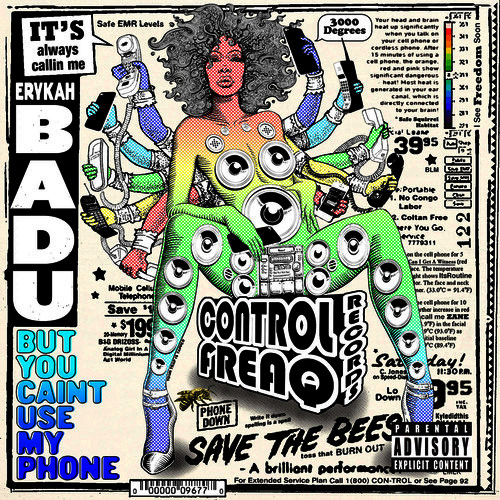By Alex Rake (The Cascade) – Email
The radio is saturated with trash. This is nothing new, but it’s also nothing to celebrate. Popular music, in order to appeal to as many people as possible, tends to uncritically accept the negative aspects of culture as the way things are or ought to be; materialism becomes a measure of hip-ness, hedonism and escapism become standard for a good time, and the synthetic becomes the only acceptable aesthetic. In other, less fancy words, much of pop music today is over-produced drinking and fucking songs stuffed with references to Twitter. There are always exceptions in the Top 40 — Alessia Cara’s “Here” wonderfully reverses the typical “Party hard!” attitude of many hits, for example — but they are few and far between.
Then Erykah Badu drops something like But U Caint Use My Phone, a masterful deconstruction of the mediocre Drake hit, “Hotline Bling.”
In the Drake song, the singer finds himself forlorn when he realizes his girl won’t call his cell anymore because she’s having more fun going out on the town without him. He feels sad that she’s gone, but he never really addresses the influence of technological dependence and party culture on his current state. Cell phones and clubbing are simply givens, things that people need and are never going to stop needing. Especially in the context of current pop music, these things are normal and good.
Badu’s mixtape counters Drake’s acceptance of materialism and hedonism by homing in on the more spiritual aspects of relationships in technology-dependant times. By “spiritual,” I don’t mean anything religious, but I mean she has a deeper, more natural, and dynamic grasp on what it means to live today. Whereas “Hotline Bling” features Drake’s voice struggling to get across on top of a produced-to-shit beat with lyrics taking advantage of — rather than drawing attention to — cultural and social conventions, Badu’s re-titled cover, “Cel U Lar Device,” is more complexly arranged and produced, and her singing sounds more human in its timbre and cadence.
The surrounding tracks on the mixtape also contextualize “Cel U Lar Device” in such a way that its lyrics are impossible to hear uncritically. For example, “Dial’Afreaq” pins the sudden decline of bees on the sudden increase in cell phone radiation, lamenting the unlikelihood of this knowledge actually affecting anyone enough to give up the convenience of cellphones; “Phone Down” sees Badu betting the listener that she “can make you put your phone down” with the real, physical things she can do to you; and “Hello” finishes the whole shebang with a surprisingly non-corny rap about the importance of meaningful communication between people to a backdrop of nature sounds. It’s beautiful, not to mention just as catchy and danceable as anything on the radio.
Erykah Badu is a soul singer in the truest sense. Since her 1997 record Baduizm, she has been digging through the vapidity of modern culture to find the human nugget that remains at its centre. With the current context of radio music fattened up with artists like Drake and The Weeknd, Badu is as relevant as ever, giving our spirits the exercise and diet they need after last night’s black-out binges.
Sent from my iPhone



